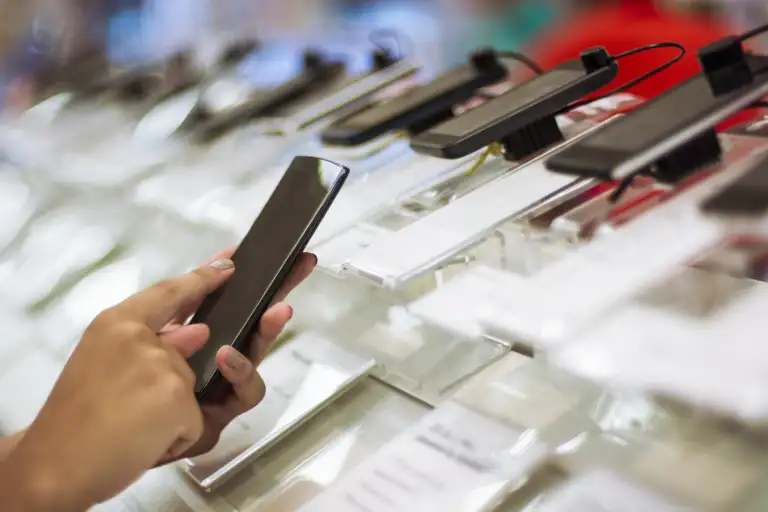
Can I back out of a cellphone contract after signing it?
When you get a cellphone, you’re buying two things: the phone handset and the cellphone service. For the service — which is what lets you use the phone — most people sign a contract with a cellphone service provider. Learn your rights for this type of contract.
What you should know
"I signed up for a cellphone plan under a promotion my provider was offering. Or at least I thought I did. The salesperson wouldn’t give me a copy of the contract, saying they would email it after I left the store. When I got the contract, it didn’t include the promotional offer. I complained. Turns out the law requires them to give me a copy of the contract at the point of sale, in the store. The provider apologized and honoured the promotion."
– Virginia, Surrey, BC

You can buy a laptop or a TV and then walk right out of the store — there’s no contract to sign with an internet provider or a cable company. A cellphone is different. Most people who get a cellphone sign a contract with a service provider, typically in exchange for a “free” or discounted phone.
A service contract with a phone provider is called a postpaid service contract in the Wireless Code, Canada’s main set of rules for cellphone service providers.
In the contract, you agree to make a minimum payment each month for the term of the contract, typically two years. Your payment covers a certain number of calls and texts, and (optionally) a set amount of data. If you go over those limits, you have to pay extra.
When you sign a cellphone contract, the Wireless Code offers you several legal protections. We highlight the key ones here.
Nothing is truly free
Signing a service contract with a phone provider can be a way to get the plan or phone you want at a low upfront price. But your "free" phone is not actually free. The cost is typically built into the contract payments. So you’re effectively paying off the full cost of the phone over the length of the contract. Take time to do the math. It might make sense to buy and bring your own phone to avoid having to pay higher monthly fees.
Broadly speaking, there are two types of cellphone contracts:
Pay-as-you-go contracts have you prepay for your voice, text and data in advance, and you then use it over time. The charges can be monthly, or for a fixed amount of usage (say, a bucket of data that lasts until you use it all). These contracts typically do not lock you into a long-term commitment.
Monthly plans have you pay for your services at the end of each month. You chose a monthly plan for voice and data, and are responsible to pay more if you go over your plan’s allotment. These plans typically lock you into a long-term commitment — unless you are bringing your own device, in which case you usually aren’t locked in long term.
When you get a new phone, it is typically on a monthly plan. Each month, you pay down a portion of the cost of the phone (which the provider likely didn’t charge you in full for up front). If you try to cancel the contract, you’ll typically have to pay for the remaining amount owing for the new phone. More on this here.
Careful with new phone plans
With most plans, service providers give you a new phone (in return for you paying it down over time). However, some providers are only leasing you the phone. This means that at the end of the contract term, the provider still owns the phone. Make sure you know which type of arrangement you’re getting into.
When you agree to a cellphone contract, the service provider must give you a free permanent copy of the contract and related documents. Related documents include any “fair use policy” and privacy policy.
When the provider must give you the contract
If you agree to the contract in person, the service provider must give you the contract and related documents immediately, at the point of sale.
If you agree to the contract on the phone or online, the provider must send you the contract and related documents within one business day if you opt for electronic format.
If you choose to get a paper copy of the contract, the provider must send it and related documents to you within 15 days.
You get to choose the format
As between getting an electronic or paper copy of the contract, you get to choose. The provider can’t force you to accept a particular format. For example, a provider’s contract can’t say that by signing the contract you agree to receive the contract by email.
If you don’t get a copy within the required time
If the provider doesn’t provide the contract within the required time frame, you can cancel without any penalty. You have up to 30 days after receiving a copy of the contract to cancel it for this reason.
During the term of the contract
The service provider must also provide you with a permanent copy of the contract in the format of your choosing (electronic or paper) upon request, at no charge, at any time during the term of the contract.
Cellphone contracts are standard form contracts. This means the service provider has prepared it, and typically will resist negotiating or changing the wording.
Still, under the Wireless Code, the contract and related documents must be written in clear, plain language and be easy for you to understand. The prices set out in the contract must be clear and must indicate whether they include tax.
Any ambiguity in your contract must be interpreted in a way that favours you.
The contract must clearly describe the services you’ll receive, and include information on when and why you may be charged extra.
Key contract terms and conditions
Under the Wireless Code, the contract must clearly set out the key contract terms and conditions. These include:
the voice, text, and data services
any limits on the use of those services that could trigger overage charges
the minimum monthly charge for services
the length of the commitment period, including the end date of the contract
any early cancellation fees, how much they decrease each month, and when a cancellation fee no longer applies
if you received a free or discounted phone on signing the contract, the retail price of the phone, and the amount you paid for the phone
If the contract doesn’t set out the key terms and conditions you agreed to, you can cancel without any penalty. You have 30 days after receiving a copy of the contract to cancel it for this reason.
Other terms the contract must set out
As well, the contract must clearly set out:
the trial period for the contract, including any limits on use during the trial period
whether upgrading the device or amending a contract term will extend your commitment period or change any other aspect of the contract
whether the contract will be extended automatically on a month-to-month basis when it expires
where you can find information about the service provider’s coverage area, tools to manage your bills, how to make a complaint, and the Wireless Code
Read your contract closely
The agency that manages complaints against cellphone service providers reports that the top complaint is a mismatch between what a customer has agreed to buy and what their contract indicates. Read your contract closely (or, at the very least, the critical information summary) to ensure it reflects any promises made to you, and that you understand any limits associated with promotions you’re offered.
When the provider gives you your contract, they must also provide a critical information summary that summarizes the most important elements of it.
The summary must be clear and concise (not over two pages), in plain language, and in an easy-to-read font.
It must include:
all key terms and conditions of the contract — the services included in the contract, any limits on those services, the minimum monthly charge for services, the length of the commitment period, any early cancellation fees, and (if you received a subsidized phone) the retail price and the amount you paid for the phone
any limits on “unlimited” services
any one time charges and additional fees
the total monthly charge, including rates for optional services you selected
information about the trial period, including any limits on use during the trial period
information on how to make a complaint
The summary is separate from the contract
The critical information summary is intended to summarize the contract, not replace it. The summary may be provided as a separate document from the written contract or prominently as the first pages of the written contract.
Under the Wireless Code, any phone a service provider gives you must be unlocked. (When a phone is locked to a network, it can only work with that provider’s voice, text, and data services.)
A provider can’t charge you to unlock a phone.
After signing a cellphone contract, you have a 15-day trial period to decide whether it’s what you want. During this period, you’re legally entitled to cancel the contract — for any reason — at no charge.
But you can’t have burned through more than half of your monthly usage limits. And you must return the device in near-new condition, in the original packaging.
For persons with disabilities, the trial period is 30 days, and the usage limits are doubled.
We have more on your cancellation rights here.
If you decide to cancel during the trial period
To cancel during the trial period, be sure to act while you’re still in the trial period. The trial period starts on the date on which your service begins. Within 15 calendar days, return the device to the provider in the original packaging. Also, it’s best to follow-up in writing.
The next step
Ready to take action?
We walk you through how to negotiate with a cellphone provider.

